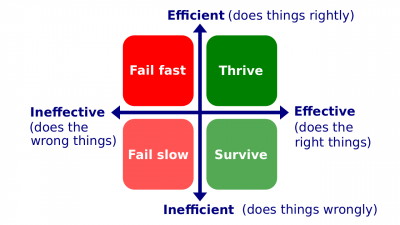Difference between revisions of "Efficiency"
(→Related coursework) |
|||
| Line 9: | Line 9: | ||
*[[Effectiveness]]. The degree to which an [[enterprise]] does those [[activity|activiti]]es that result in achieving its [[goal]]s. In other words, [[effectiveness]] is the measure of how an [[enterprise]] meets the needs of its clientele or customers.<blockquote>[[Efficiency]] is doing things right; [[effectiveness]] is doing the right things. -- ''Peter Drucker, management consultant''</blockquote> | *[[Effectiveness]]. The degree to which an [[enterprise]] does those [[activity|activiti]]es that result in achieving its [[goal]]s. In other words, [[effectiveness]] is the measure of how an [[enterprise]] meets the needs of its clientele or customers.<blockquote>[[Efficiency]] is doing things right; [[effectiveness]] is doing the right things. -- ''Peter Drucker, management consultant''</blockquote> | ||
| − | ==Related | + | ==Related lectures== |
*[[Resource Planning Quarter]]. | *[[Resource Planning Quarter]]. | ||
[[Category: Septem Artes Administrativi]][[Category: Articles]] | [[Category: Septem Artes Administrativi]][[Category: Articles]] | ||
Revision as of 20:12, 4 January 2019
Efficiency is the degree to which an enterprise gets the most outputs from the least amount of inputs.
Definitions
According to Organizational Behavior by Robbins and Judge (17th edition),
- Efficiency. The degree to which an organization can achieve its ends at a low cost.
Related concepts
- Performance. The end result of an activity.
- Effectiveness. The degree to which an enterprise does those activities that result in achieving its goals. In other words, effectiveness is the measure of how an enterprise meets the needs of its clientele or customers.
Efficiency is doing things right; effectiveness is doing the right things. -- Peter Drucker, management consultant
